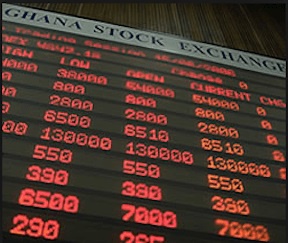The signals of recovery from the financial crisis that hit the economy in 2017 have begun to positively to impact on the performance of the Ghana Stock Exchange in the first month of this year.
The market’s benchmark index, GSE Composite index (CI) at the end of trading session on Thursday, January 23, 2020, had recorded a return of 0.90 percent to investors, while instructively, the GSE financial stock index (FSI) made an even better return of 1.57 percent.
This performance depicts a continuation of recovery from the bearish performance on the market which started in the December 2019, after two years of a bear market which saw both indexes fall significantly during both consecutive years.
The GSE Composite Index (GSE-CI) measures the weighted average price changes of all the equities listed on the market; and the GSE Financial Stock Index (GSE-FSI) – tracks the weighted average price changes of financial services equities.
The GSE-CI during the first month of 2019, January 23, 2019, returned about -2.72 percent, year to date, whereas the GSE-FSI returned about -2.41 percent. This means this year, so far is a complete reversal of the same period of 2019.
The market on November 20, 2019, recorded its lowest year-to-date (YTD) return to investors when the GSE-CI’s performance stood at -16.93 percent as well as the GSE-FSI returning about -17.28 percent to investors.
However, by the end of 2019, the market had made a partial recovery, recording a full year return of -12.25 percent with regards to the GSE-CI and -6.23 percent on the GSE-FSI. This recovery has continued into the first month of this year, raising hopes that a long awaited – and direly needed – rebound may finally be underway.
The bear market of the past two years can primarily be blamed on the financial sector crises because inflation, interest rates, exchange rates and other indicators have been fairly stable during the period and corporate earnings – outside of some financial sector firms – have generally been strong.
The financial sector is currently the dominant sector trading on the market, hence its heavy influence on the outcome of the overall performance of the exchange.
According to Trading Economics, the Ghana Stock Market Composite GSE-CI is expected to trade at 2275.78 points by the end of this quarter, according to Trading Economics global macro models and analysts’ expectations. “Looking forward, we estimate it to trade at 2217.47 in 12-months time” concludes the highly respected global financial markets analyses firm in its latest forecast.
Trend Analysis
Based on trend analysis, analysts in the market are predicting that the Ghana Stock Exchange should rebound this year, an election year after a poor performance in 2019. Trends show that the Ghana Stock Exchange (GSE) has followed a particular pattern in election years and 2020 may not be different.
The biggest return was in 2004 when it returned 91.33 percent followed by 2008 and then 2012 returning 58.06 percent and 23.81 percent respectively. 1992 and 2016 were different however, as the market returned -3.63 percent and -15.33 percent respectively. This casts some uncertainty on chartist based bullish sentiment.
But there is support for their predicted outcome this year from (weak) efficient market theorists who point to the likelihood of imminent monetary easing by the Bank of Ghana, and consequent lower interest rates coupled with increased liquidity for local investors, as an expected driver of higher equity prices.
2020 Projections
The Exchange is set to roll out some plans that will attract more companies to list shares or sell bonds, improve liquidity and make the local bourse the sub-region’s preferred destination to raise long-term capital, improve corporate governance and make money.
In view of the markets performance in 2019, the leadership and managers of the bourse believe that a raft of measures including transitioning the exchange from a frontier to emerging market, getting 100 equities listed in five years, and improving liquidity via attracting more retail investors would make the GSE one of the biggest players in the region.
Business News of Wednesday, 29 January 2020
Source: www.goldstreetbusiness.com
Financial stocks lead stock market rebound
 Ghana Stock Exchange (GSE)
Ghana Stock Exchange (GSE)
















